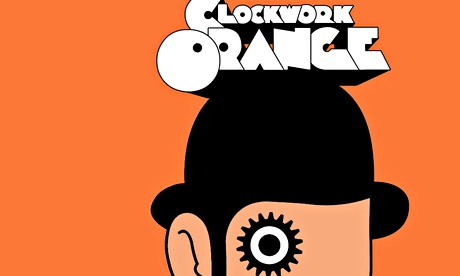
While real-life juvenile delinquency is depressing in the extreme, there is an undeniable frisson generated by the fictional juxtaposition of innocence and evil – of boys and girls gone bad and youths wicked beyond their years. Just think of ruthless 17-year-old gang boss Pinkie in Graham Greene’s Brighton Rock, or murderous would-be-übermensch Raskolnikov in Dostoyevsky’s Crime and Punishment, or the machiavellian Steerpike wending his way through Mervyn Peake’s Gormenghast novels; then there’s the legions of troubled children who populate the literary landscapes of Charles Dickens, William Trevor and Stephen King. But when it comes to pure evil – evil as a force of nature – Alex, the 15-year-old narrator of Anthony Burgess’s 1962 novel, A Clockwork Orange, is in a league of his own.
First and foremost there is the language. A Clockwork Orange is a reading experience unlike any other. Set in a dystopian future England, the novel is narrated in Nadsat, Burgess’s brilliantly conceived argot, made up partly of bastardised Russian. An initial response at being plunged into Alex’s world is likely to be one of bewilderment and alienation: “We sat in the Korova Milk Bar trying to make up our rassoodocks what to do with the evening.” But Alex’s tone is amiable. He addresses his readers directly, looking for friendship and understanding. (“You may, O my brothers, have forgotten what these mestos were like, things changing so skorry these days.”) As one is swept up by the rhythm of the narrative, and by the sheer inventiveness and lyricism of the language, one gradually begins to see the world through Alex’s eyes – only to be pulled up short when realising the descriptions are of acts of terrible violence.
“And, my brothers, it was real satisfaction for me to waltz – left two three, right two three – and carve left cheeky and right cheeky, so that like two curtains of blood seemed to pour out at the same time, one on either side of his fat filthy oily snout in the winter starlight.”
In this way Alex can be seen as the literary progeny of Nabokov’s Humbert Humbert in Lolita. Like Humbert, Alex uses language to disarm the reader and temper the details of his more vile acts – this being, as another character accurately observes at one point, part of “his craft and artfulness”. And while Alex never goes so far as to protest his innocence (on the contrary, he explicitly states that “what I do I do because I like to do”), he clearly believes himself to be a cut above the common criminal, stressing his love for classical music and pouring scorn as well as blows upon those he considers “mannerless”.
When the law finally catches up with Alex and he is imprisoned for murder, the boundary between good and evil becomes even more blurred. Alex is offered his freedom if he consents to undergo the Ludovico technique, a radical form of aversion therapy that will make Alex feel physically sick when confronted with evil impulses, thus forcing him to be good. Aside from moral questions regarding free will, the technique itself can be viewed as an act of evil: to a soundtrack of Beethoven, Alex is drugged and made to watch snuff movies, with the heavy implication that these have been manufactured by the government. Later, when Alex is released and falls into the hands of the government’s enemies, they have no qualms about using him as a political tool for their own ends. Alex is now utterly powerless to resist as he is tortured – once again with Beethoven – until driven to attempt suicide.
There are various stories about the novel’s final chapters, but whether it was down to Burgess’s indecision or the insistence of his publishers, two versions of the text exist. The US edition ends at chapter 20: having undergone a reversal of the Ludovico technique, Alex is in the employment of the government and back to his bad old self. However, the UK edition includes one more chapter, in which a slightly older and wiser Alex decides it’s time to put his evil ways behind him and settle down. (The US edition also provides a glossary of Nadsat, but that’s a whole other issue.) And though the ending of chapter 21 may seem a cop out, and certainly lacks the ironic sting of chapter 20’s final words (“I was cured all right”), the reader can, perhaps, gain some perverse comfort from signs that Alex doesn’t appear wholly at ease with his reformed self:
“And so farewell from your little droog. And to all others in this story profound shooms of lipmusic brrrrrr. And they can kiss my sharries. But you, O my brothers, remember sometimes thy little Alex that was. Amen. And all that cal.”
• Baddies in books: read more Guardian writers on their favourite literary villains

